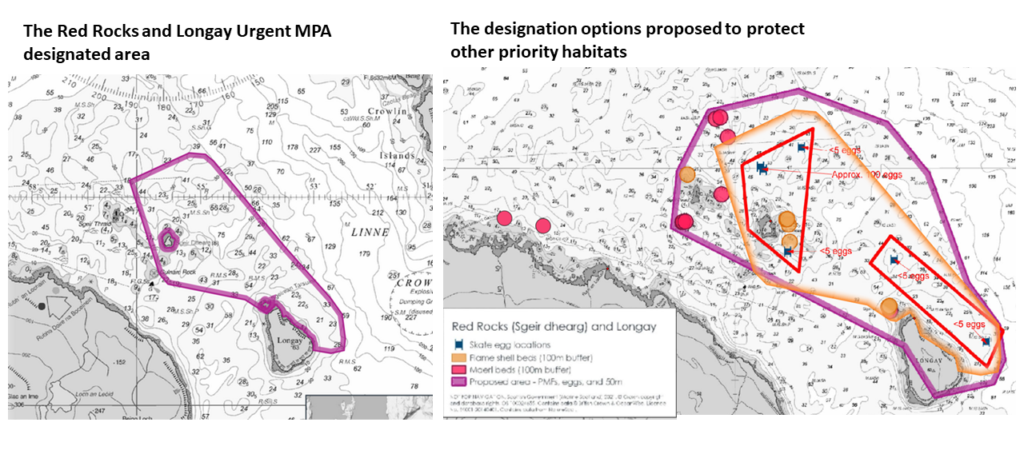The Scottish Government has announced an emergency marine protected area (MPA) to protect a critically endangered flapper skate egg site near the Isle of Skye. The Red Rocks and Longay Urgent MPA will come into force on 17 March just two weeks before the area was due to open to trawling and dredging for six months.
The six square kilometre designation will become Scotland’s largest no–take zone, but falls short of advice from Nature Scot who proposed closing a larger area. The larger area would have protected eggs and other sensitive habitats, including flame shell reefs and maerl beds, from destructive trawling and dredging. This comes just months after the Government published their decadal assessment of the marine environment showing that Scotland failed to meet a ten-year-old target to prevent damage to “priority” marine habitats such as flame shell reefs and maerl beds.
The emergency marine conservation order will prohibit a number of marine activities, including commercial and recreational fishing, diving and construction, for an initial period of twelve months. The area is important to the local scallop diving and creel fleets, activities with a low–impact on the marine environment. Specifically, the banning of recreational divers – one of groups that discovered the egg-laying site – raises questions around the evidence behind the decision.
Morven Robertson, Blue Marine Foundation’s (BLUE’s) UK Senior Projects Manager, said, “Although it is great news that some protective measures are being taken, the designated site is not as big as we hoped, and is smaller than the area Nature Scot advised. It also excludes some forms of fishing and activities such as recreational diving that we do not believe to have an impact on the egg laying site.

“Of greatest concern is that dredgers will still be allowed to operate on sensitive areas of seabed outside of the protected area that have been identified to hold priority marine features. BLUE will be focusing our efforts on the full consultation that is due to happen next year.”
BLUE has been campaigning for the closure of the site since it supported an expedition led by fishermen and divers in October 2020, which revealed over a hundred eggs nestled between rocks near the Isle of Skye. Flapper skate eggs can grow up to 29 centimetres long and take over 530 days (18 months) to hatch, making them extremely vulnerable to capture or damage by fishing gears. The site is the largest egg-laying sites or “nurseries” for flapper skate found to date.
Capable of reaching over two and a half metres in length, the flapper skate, previously known as the common skate, is one of the largest skate species in the world. It is also one of the UK’s most endangered fish. Listed as critically endangered on the IUCN red list in 2006, these magnificent creatures have declined due to overfishing.
The Red Rocks and Longay MPA will protect the site for 12 months with a full consultation planned in 2022 to develop permanent measures for the site. BLUE will focus on preparing evidence for the public consultation to ensure permanent measures protect all sensitive features at an appropriate scale. BLUE will aim to ensure that robust assessments of the impact of activities including fishing and diving carried out.
Campaigns to protect Scotland’s seas
The flapper skate story is just one example of local communities taking action to protect Scotland’s seas. The discovery of the site was led by local fishermen and divers, which ultimately led to its protection.
While over 37 per cent of Scotland’s Seas are designated as MPAs, only five per cent of its inshore seabed is protected from the most damaging scallop dredging and trawling. Our Seas is a coalition campaigning to improve this protection.
BLUE is one of 98 marine businesses, Scottish NGOs, fishing associations and community groups part of Our Seas, calling for: vessel monitoring on all boats, the reinstatement of an inshore limit and preference to low impact, non-destructive fishing practices when deciding who fishes where: http://www.bluemarinefoundation.com//www.bluemarinefoundation.com//app-crist.8yrmnzecav-zqy3jxpny4kg.p.runcloud.link//bit.ly/inshorelimit
Cover photo credit: David Ainsley


















